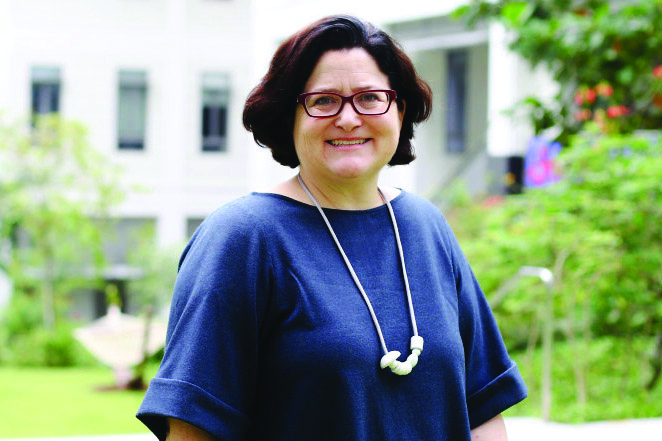
Courtesy of Yale-NUS
SINGAPORE — Yale-NUS College appointed economics professor Joanne Roberts as its inaugural associate dean for faculty development this spring, bolstering efforts to strengthen the internal tenure review process as the young college begins considering internal candidates for academic tenure.
Since joining Yale-NUS as a permanent faculty member and associate dean in January, Roberts has worked with Dean of Faculty Steven Bernasek to oversee the college’s faculty mentoring program and tenure review process. Her appointment comes six months after inaugural Dean of Faculty Charles Bailyn ’81 left the school to return to New Haven as head of Benjamin Franklin College.
“I am quite happy to be doing more on the administrative side than I have before,” Roberts said. “There are a lot of opportunities to make a difference here, and it feels exciting.”
Roberts and her husband Eugene Choo GRD ’01 taught in economics departments in Canada for nearly two decades before coming to the National University of Singapore as visiting fellows in 2012. They returned to the city-state in 2015 — this time at Yale-NUS — before joining the permanent faculty of the college this January.
According to Bernasek, Roberts’ experience in leadership roles made her stand out during the selection process. In the past, Roberts had served as the Canada research chair in the economics of organizations at the University of Calgary from 2009 to 2014.
“Roberts is great to work with,” Bernasek said in an email. “She is an accomplished professor of economics, well-organized and very professional in all of her dealings with the faculty.”
Roberts noted that one of her key priorities in her role as associate dean will be guiding the college’s faculty through the tenure process and “alleviate the anxiety inherent in any case of tenure promotion.”
The college’s faculty handbook notes that tenure-track faculty members will be considered for promotion to tenure no later than the end of their sixth year at the college. Successful candidates will then be guaranteed an appointment at Yale-NUS until the end of the academic year in which they turn 65.
Bernasek noted that Yale-NUS’ tenure review process is similar to current practices at higher education institutions in North America, including Yale. However, Roberts added that they have “a lot of work to do” to establish a credible process given the absence of significant institutional precedents for tenure review.
As the college deals with the problem of faculty turnover, many faculty members are only just beginning to go through the review process. Yale-NUS’ first two internal candidates were awarded tenure just this month following a meeting of the governing board.
“Our junior faculty going through the promotion and tenure system this year are pioneers for us — it is not the case there are people who have experienced this particular process before,” Roberts said. “It’s at the forefront of our minds that we need to take tenure seriously and to do it in a way that has at its core integrity and credibility.”
Roberts added that Yale-NUS’ institutional structure helps ensure the credibility of the tenure process and vibrancy of the college’s research and teaching environment. Not only does each case for tenure undergo additional review by the provosts’ offices at the neighboring NUS and at Yale in New Haven, but the college’s financial resources also allow it to avoid reliance on nontenure-track appointments to fulfill teaching loads.
According to the American Association of University Professors, nontenure-track positions now account for more than 70 percent of all instructional staff appointments in higher education institutions in the United States. The association claims that such appointments come with inadequate compensation, and without essential health and retirement plans.
At Yale-NUS, though, Roberts said the administration is committed to having the majority of its staff comprise tenured or tenure-track faculty.
“It is a luxury of our resources that we do not feel the intense financial pressure to move towards more sessional appointments,” Roberts said. “We are lucky that we have good institutional support.”
She also stressed that tenure decisions will not at all consider the political valence of any material being taught by faculty members. Critics of Yale-NUS have consistently cited concerns with the extent to which academic freedom can be guaranteed in Singapore.
“We’re really committed to ensuring that there is freedom of speech and academic freedom on campus,” Roberts said. “Visiting alleviates a lot of people’s concerns.”
In July, Roberts will also become the director of the college’s Department of Social Sciences.







